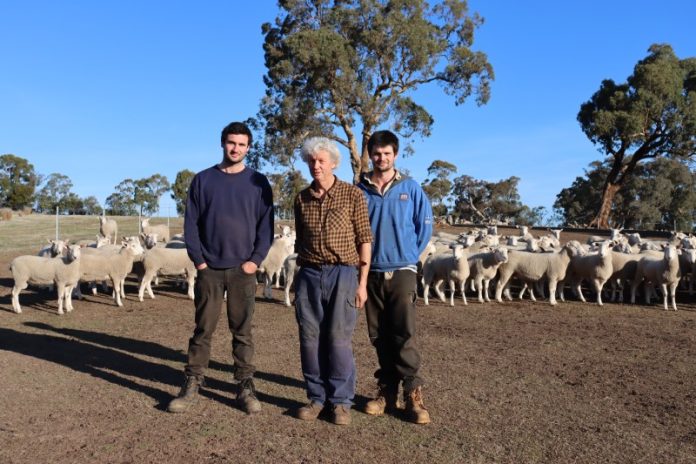Michael O’Sullivan can’t remember a period of drought as challenging as the one we are now experiencing.
Together with his sons, Martin, John and Anthony, the Baynton farmer breeds sheep and cattle on close to 3000 hectares of grazing land. Like many other farmers, they have had to shed stock to survive.
“I’ve been through the ’82 drought and the millennium drought and they were all challenging, but in most cases we’d had a good break. We’d gotten through with a very dry spring and summer but then we had an autumn break, which set us up for the winter,” Mr O’Sullivan said.
“In this case, it’s been building up for the last two years and we’ve had little pockets of rain but nothing substantial.
“Because last spring failed and there was no autumn break, we’ve depleted our water resources to such low levels, it’s been a real challenge for us.
“I don’t think I’ve seen a year like this that’s been so deficient for so long and we’ve gone into the winter with so little feed.”
The O’Sullivans have had to sell off 160 cows over the past four weeks.
“We got to a timeline where we knew we weren’t going to be able to get them through, we’re just down to our core group of breeders at the moment,” Mr O’Sullivan said.
“We exhausted all our own on-farm supply of grain and hay in about April so we’re now sourcing barley and hay to try to supplement the feed.
“We’re using 27 tonne of barley a week just to feed our sheep and that’s costing us about $10,000 a week in grain alone.
“We’re getting hay where we can, when we can, but it’s very hard to source now, it’s in very short supply.”
Mr O’Sullivan said the little bit of rain they’d had was not enough to produce growth in the paddocks.
“We’ve got a little bit of rain and that’s absolutely wonderful, but it’s not in March or April when we’re going to get growth, we’re not going to get anything until our spring now because of our frosts and our ground temperature’s dropped that much,” he said.
“All of Victoria and South Australia are going through this, it’s huge.
“And to think that they’re bringing in hay from Queensland now, I’ve never known that before. It just shows how desperate people are to keep their stock going.”
UNFAIR BURDEN
The O’Sullivans believe the state government has not fully considered the hardships farmers are facing before imposing the new Emergency Services and Volunteers Fund levy on primary producers.
The new levy replaces the former Fire Services Levy and will come into effect from July 1 this year. The government has given primary producers a reprieve on paying the higher levy until July 1 next year.
Although eligible for a rebate as volunteer firefighters, the O’Sullivans estimate the new tax will cost them an extra $12,000 a year on top of their rates.
“We are very concerned about the sharp increase in the Emergency Services Levy and the unfair burden it places on rural landholders – especially those who have historically built and supported the very foundation of the CFA,” Mr O’Sullivan said.
“From our own calculations, our levy will increase by $12,283. This is not a minor adjustment; it is a disproportionate cost for families like ours, who have not only lived on the land for generations but have been integral to the development of the CFA.
“Three generations of my family have served as captain, lieutenants, ERS operators and firemen over many years. We housed the fire truck on our property because there was no official station, and we later provided the land on which the current Pastoria fire station now stands.
“Our story is not unique, countless volunteers and farming families across Victoria have built the CFA from the ground up.”
Mr O’Sullivan said it felt unjust that those who gave the most in time, resources and even land were now being penalised the most.
“Without farmers, there would be no CFA and no volunteer fire services in the country. And yet we are now shouldering the brunt of this financial weight,” he said.
“We understand the need for well-funded emergency services. But the system must be fair.
“Levy increases of this scale risk alienating the very people who continue to defend their communities in times of crisis.”








